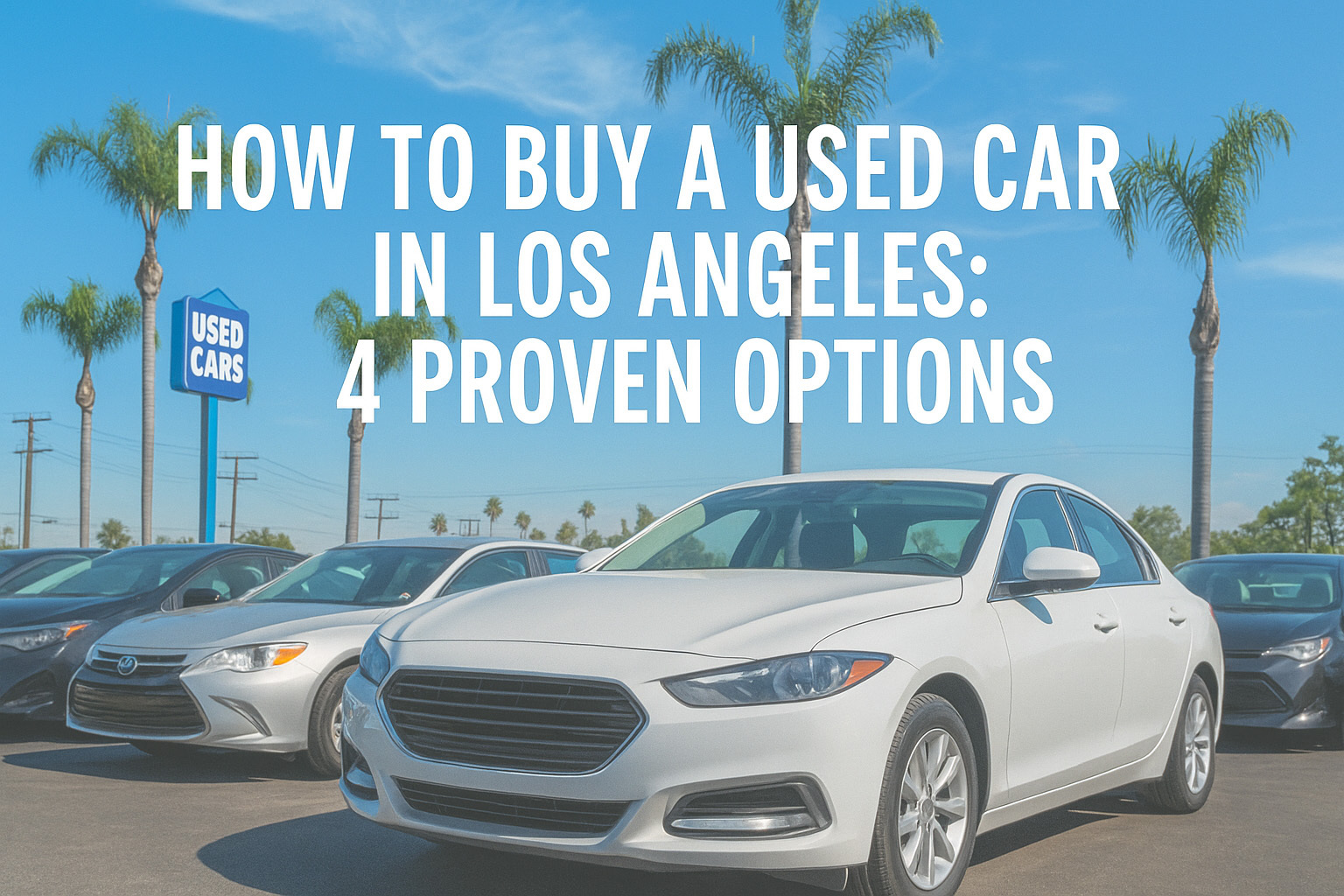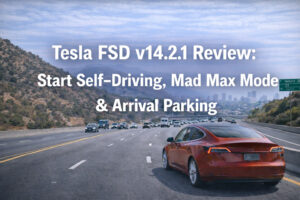How to Buy a Used Car in Los Angeles: 4 Proven Options

Want to Buy a Used Car in L.A.? Here Are Your Options!
When you’re looking to purchase a used vehicle in Los Angeles, you’ve got plenty of routes to choose from.
Each buying method has its own quirks, so we’ve broken down the pros and cons for you.
If you’re considering snagging a pre-owned ride in the U.S., be sure to give this guide a read!
The videos embedded in this article are narrated in Japanese, but English subtitles are available.
1. Buying from a Manufacturer Dealer
Pros:
For many newcomers to the U.S., a manufacturer-affiliated dealer—think Toyota or Honda—tops the list when it’s time to buy a car.
These dealers offer Certified Pre-Owned vehicles, giving you a good shot at snagging a higher-quality used car.
Every Certified Pre-Owned vehicle undergoes rigorous inspection, meaning you get cars that:
- Have no accident history
- Come with verified quality assurance
- Include an extended warranty
After-sales service is solid, and if you go with a warranty, you can tap into post-purchase support.
If your budget allows and you’re comfortable handling everything in English, a Certified Pre-Owned car could be a smart choice.
Cons:
Certified Pre-Owned cars offer great peace of mind, but they’re typically priced higher than cars bought through other channels.
Plus, if you’ve just arrived in the U.S. you probably don’t have a credit history, so you may not qualify for financing—or you might face interest rates you’d never see in Japan.
Paying the full amount in cash avoids this issue, but if you’d rather conserve cash, this option may not be ideal.
Sales staff can be pushy, and the technical terms can make negotiations challenging if you’re not comfortable in English.
Also, while Certified Pre-Owned cars come with warranties, many other dealer vehicles do not.
You may be able to negotiate a warranty, but if you can’t, you might want to consider a different buying method.
2. Buying from an Independent Used-Car Dealer
Pros:
Independent dealers usually beat manufacturer dealerships on price—that’s their single biggest draw.
They carry a wide variety of brands and models, so your pool of choices is much larger.
Some lots also offer their own service packages, warranty programs, and post-purchase follow-ups.
If the dealer has an in-house service shop, you may get reliable maintenance after the sale as well.
Certain dealers even provide their own financing options.
Because the approval process is in-house, you might qualify for a loan even without a U.S. credit history—great if you’d rather keep your cash on hand.
Financing varies by dealer, so always ask what plans are available.
Cons:
Dealer quality varies widely—from mom-and-pop lots to large chains—so the level of service and the condition of the cars can fluctuate dramatically. Buying without doing your homework can be risky.
Unfortunately, some dealers still engage in shady practices, so it’s crucial to identify a seller you can trust.
To avoid post-purchase headaches, always check a dealer’s ratings and customer reviews.
Because used cars can develop issues after a short time, confirm whether any warranty is included before you sign the paperwork.
Tip: Do Good Independent Dealers Keep Staff Longer?
Based solely on my own experience, high-quality used-car dealers tend to have low employee turnover.
I explain why starting at the 5:00 mark of the video below—have a look if you’re curious!
This video also covers everything we’ve discussed so far about buying from manufacturer dealers vs. independent used-car lots.
3. Buying from a Private Seller
Pros:
A private-sale purchase means buying the car directly from its current owner.
While this approach isn’t very common in Japan, it’s quite popular in the U.S.—people often connect through classified websites and complete the sale on their own.
Prices are usually set below typical market value, and dealing one-on-one lets you ask detailed questions about the car’s condition and maintenance history.
You might even uncover a rare vehicle that isn’t listed anywhere else, making the search feel like a treasure hunt.
When it comes to price, this method can be the cheapest way to acquire a car.
Cons:
The biggest downside is the lack of any warranty—you alone must inspect the car and judge its condition.
All price negotiations and paperwork are your responsibility, and you’ll need to handle everything in English.
Even if you ask the owner directly about the car’s history, you have no way to be 100 % certain they’re telling the truth, so unexpected problems can surface after the purchase.
Because it’s a private sale, you won’t get dealer financing; many sellers expect full payment in cash.
Buying from a friend can feel safer than dealing with a total stranger, but even then, it’s wise to have a mechanic inspect the vehicle before you commit.
Common Pitfalls in Private Sales
- You buy the car only to discover it has no title
- Poor maintenance causes it to break down quickly
- It fails the smog test, requiring repairs before it can be registered
4. Using a Pre-Owned Car Lease
Pros:
With a lease you pay a monthly fee to use the vehicle for a set term.
Compared with buying, you can keep upfront costs—like a down payment—much lower, making this option attractive if you’re on a tight budget.
During the lease the company generally covers routine maintenance and repair costs, so you worry less about breakdowns.
Compared with brand-new leases, terms are often more flexible, letting you tailor the contract for short stays or other specific needs.
You don’t have to fret about depreciation, and you skip the hassle of selling when you leave the U.S.—the car simply goes back to the leasing company.
If you’re unsure how long you’ll stay in America or you just want to travel light, a used-car lease can be an ideal solution.
Cons:
Watch out for early-termination penalties and mileage caps.
If you rack up a lot of miles every month, buying might give you more freedom.
Early-out fees and rules vary by company, so confirm the policy before you sign.
If the car’s condition differs greatly from the expected wear and tear at return, you could face extra charges.
Used-car leases are generally simpler and more flexible than new-car leases, but terms differ from one leasing company to the next, so always review the details carefully before committing.
Catch the rest of the explanation in this video!
Summary
In car-centric America—especially Los Angeles—you’ll likely need your own set of wheels.
When buying a used car in L.A., weigh the pros and cons of each option so you can choose what fits your situation best.
Before handing over any cash, double-check the vehicle’s condition, price, and service terms to ensure a safe, satisfying purchase.
EcoDrive also sells pre-owned cars, of course.
Our hybrid models come with an unheard-of two-year warranty in the U.S. used-car market, so take a look!
Our Services
We offer comprehensive automotive solutions—buy, sell, rent, and repair in one place.
Car Sales
Browse our lineup of quality used cars with transparent pricing and up to a two-year warranty on select models.
View InventoryAuto Repair
Get expert service from our certified Toyota Master Mechanic. We primarily service Toyota vehicles.
Schedule ServiceTrade-in / Sell
We pay top dollar for your vehicle—especially hybrids. Count on fair, transparent appraisals.
Get EstimateCar Rentals
Choose between fuel-saving hybrid rentals and a Tesla with Full Self-Driving Capability—both at competitive rates.
Reserve Now





